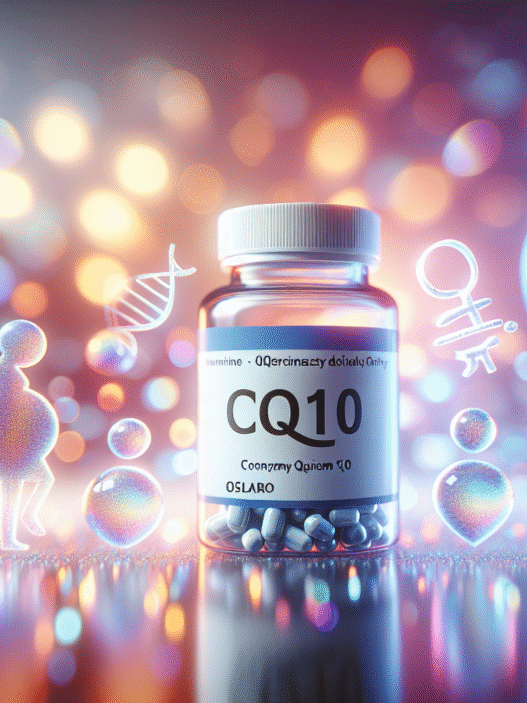Understanding CoQ10
Role of CoQ10 in Skin Aging
Coenzyme Q10 (CoQ10) is an endogenous enzyme found in every cell of the human body, vital for energy production. After the age of 20, natural CoQ10 levels begin to decrease. This decline contributes to visible signs of aging, such as wrinkles, fine lines, and loss of skin elasticity.
CoQ10 functions as a robust antioxidant, helping to neutralize reactive oxygen species and other free radicals that damage cells and accelerate aging. UV exposure further depletes CoQ10 levels in the skin, exacerbating aging signs.
Benefits of CoQ10 for Skin
Topical and supplement forms of CoQ10 can replenish these decreasing levels, promoting healthier, more youthful skin (City Skin Clinic). Here are some key benefits:
- Antioxidant Protection: CoQ10’s potent antioxidant properties help protect the skin against environmental stressors and oxidative damage (Journal of Clinical and Aesthetic Dermatology).
- Energy Production: CoQ10 is central to cellular energy metabolism, stabilizing mitochondrial activity and supporting cell function, leading to improved skin vitality (Journal of Clinical and Aesthetic Dermatology).
- Reduction of Aging Signs: Supplementing with CoQ10 minimizes the appearance of wrinkles and fine lines by enhancing skin elasticity and firmness.
A table illustrating the decline in CoQ10 levels with age:
| Age Group | CoQ10 Level (Relative %) |
|---|---|
| 20-30 | 100% |
| 30-40 | 82% |
| 40-50 | 60% |
| 50+ | Less than 50% |
For further exploration of CoQ10’s benefits, visit coq10 and skin health and coq10 and skin elasticity.
CoQ10 is available in various forms, including capsules, syrups, and topical products. For product recommendations, check our page on coq10 skin care products.
To learn more about CoQ10’s role in collagen production and its impact on skin resilience, see our dedicated section on coq10 and collagen production.
CoQ10 in Skincare
Penetration and Antioxidant Protection
Coenzyme Q10 (CoQ10), a powerful antioxidant, plays a critical role in skincare by penetrating the skin layers and offering robust antioxidant protection. Scientific evidence supports that CoQ10 can reach deeper skin layers, providing benefits such as shielding the skin from oxidative stress and aiding in the natural repair processes. For those unfamiliar with oxidative stress, it results from an imbalance between free radicals and antioxidants in the body, leading to skin aging and damage.
When applied topically, CoQ10 helps combat free radicals, which are responsible for premature skin aging. The antioxidant properties of CoQ10 reduce visible signs of aging such as wrinkles, fine lines, and dullness. This makes it an excellent ingredient in anti-aging skincare routines.
Improving Skin Elasticity
CoQ10 is particularly beneficial for enhancing skin elasticity. As we age, natural levels of CoQ10 in the skin decline, leading to a loss of firmness and elasticity. This can result in sagging skin and wrinkles. By replenishing these levels, CoQ10 helps maintain the skin’s structure and resilience.
Studies have shown that CoQ10 application can increase the production of fibroblasts and the expression of collagen, elastin, and other essential proteins that maintain skin structure. Here’s a breakdown of how CoQ10 contributes to skin elasticity:
- Fibroblast Proliferation: CoQ10 supports the growth of fibroblasts, cells that produce collagen and elastin, essential for maintaining skin structure.
- Collagen Synthesis: Increases mRNA expression of collagen types I, II, and VII, contributing to firmer skin.
- Elastin Production: Enhances elastin levels, improving skin flexibility and resilience.
- Heat Shock Protein 47: Elevates levels of this protein, which stabilizes and protects collagen molecules.
| Benefit | Function |
|---|---|
| Fibroblast Proliferation | Enhances the growth of cells responsible for producing collagen and elastin. |
| Collagen Synthesis | Boosts the expression of various collagen types, contributing to skin firmness. |
| Elastin Production | Increases elastin levels, improving skin flexibility and resilience. |
| Heat Shock Protein 47 | Stabilizes collagen molecules, protecting them from degradation. |
Incorporating CoQ10 into your skincare routine can offer significant improvements in skin elasticity and overall health. Interested readers can explore more CoQ10 skincare products to find the best formulations for their needs.
For those looking to incorporate CoQ10 into their skincare regimen, detailed guidance on the optimal dosages and supplementary options is available in our resources on the best CoQ10 supplements and coq10 dosage for anti-aging. Integrating these products consistently can lead to visible improvements in skin elasticity, making CoQ10 a vital component in fighting the signs of aging.
Skin Health and CoQ10
Exploring the role of CoQ10 in skin health reveals how this powerful enzyme aids the body in maintaining youthful, vibrant skin.
Skin Repair and Natural Energy
Coenzyme Q10 (CoQ10) is crucial for cellular energy production. Naturally produced in the body, its levels begin to decline after age 20 (Byrdie). This decline can lead to reduced efficiency in skin repair processes and overall cellular function. By aiding in cellular repair, CoQ10 helps maintain the health of skin cells, allowing them to recover from damage more efficiently, particularly from UV radiation and pollution (Nivea UK).
CoQ10 also supports mitochondrial function within cells, which leads to increased cellular respiration and improved repair mechanisms (Journal of Clinical and Aesthetic Dermatology). This is essential in preventing skin cells from converting to anaerobic energy production, ensuring that the skin maintains optimal energy levels for better resilience against aging and environmental stress.
Benefits for Different Skin Types
CoQ10 offers a myriad of benefits across various skin types, making it a versatile ingredient in anti-aging skincare. For dry skin, CoQ10 helps to maintain moisture levels and protect against environmental aggressors (Healthline). For oily and combination skin, CoQ10 aids in regulating the skin’s natural oil production, potentially reducing the occurrence of acne and breakouts.
Individuals with sensitive skin also benefit from the antioxidant properties of CoQ10, as it reduces oxidative damage and inflammation caused by environmental stressors.
Here’s a look at the benefits of CoQ10 by skin type:
| Skin Type | Benefit of CoQ10 |
|---|---|
| Dry Skin | Maintains moisture, protects against dryness |
| Oily/Combination | Regulates oil production, reduces breakouts |
| Sensitive Skin | Reduces inflammation, protects from UV damage |
| Aging Skin | Enhances elasticity, reduces wrinkles |
For more information on incorporating CoQ10 into your routine, visit our sections on coq10 skin care products and coq10 for youthful skin. To delve deeper into the science behind this powerful enzyme, see coq10 and mitochondrial function and coq10 and skin elasticity.
By incorporating CoQ10 into your skincare regimen, you can help ensure that your skin remains healthy, resilient, and youthful.
CoQ10 and Collagen Production
CoQ10 (Coenzyme Q10) is a potent antioxidant that plays a crucial role in promoting skin health by improving collagen synthesis and enhancing skin resilience.
Role in Collagen Synthesis
Collagen is a key structural protein in the skin, providing it with strength and elasticity. As individuals age, collagen production naturally declines, leading to wrinkles and sagging skin. CoQ10 helps to counteract this process by boosting the natural synthesis of collagen.
Studies have shown that CoQ10 can increase the production of collagen, thereby improving overall skin structure. By enhancing the collagen matrix, CoQ10 aids in maintaining skin firmness and elasticity, which are essential for a youthful appearance. For those interested in learning more about CoQ10’s role in skin health, visit our article on coq10 for skin elasticity.
Impact on Skin Resilience
CoQ10 also plays a vital role in improving the skin’s resilience. This powerful antioxidant helps to restore the skin’s natural energy, enabling it to better withstand environmental stressors such as UV radiation and pollution. According to City Skin Clinic, CoQ10 can make the skin more resilient against these external factors, which is particularly beneficial for individuals in their 30s and beyond who aim to maintain vibrant and youthful skin.
The ability of CoQ10 to combat oxidative stress and reduce free radical damage further contributes to its impact on skin resilience. By protecting the skin cells from oxidative damage, CoQ10 promotes the natural repair processes of the skin, thereby enhancing overall skin health.
Research supports the efficacy of CoQ10 in reducing visible signs of aging. A 2017 study reported by Byrdie found that oral CoQ10 supplements can significantly reduce the appearance of wrinkles and result in smoother skin. Incorporating CoQ10 into your skincare routine can provide both immediate and long-term benefits, making it an excellent choice for those looking to improve skin resilience.
| Benefit | CoQ10 Impact |
|---|---|
| Collagen Synthesis | Increased production, improved skin structure |
| Skin Resilience | Enhanced energy, protection from environmental stress, reduced oxidative damage |
By understanding the role of CoQ10 in collagen production and its impact on skin resilience, individuals can make informed decisions about incorporating this powerful antioxidant into their skincare regimen. For more information on CoQ10 skincare products, check out coq10 skin care products and explore the potential benefits for yourself.
For further reading on how CoQ10 can benefit aging skin, explore our articles on coq10 benefits for skin, coq10 and skin aging, and coq10 anti-aging properties.
CoQ10 Skincare Products
CoQ10, also known as Coenzyme Q10, is renowned for its anti-aging properties, particularly its ability to enhance skin elasticity and reduce wrinkles. Here, we explore the various skincare products incorporating CoQ10 and how to seamlessly integrate them into your skincare routine.
Range of Products
A wide array of CoQ10-infused products is available on the market, catering to different skincare needs. These products aim to reduce wrinkles and improve skin elasticity, offering benefits such as reducing visible signs of aging and promoting an overall healthy and radiant complexion.
Popular CoQ10 skincare products include:
- Serums – Lightweight and easily absorbed, serums are ideal for delivering a concentrated dose of CoQ10 to the skin.
- Day Creams – These creams offer hydration and protection against environmental aggressors during the day.
- Night Creams – Formulated to work overnight, these creams support skin repair and rejuvenation.
- Eye Creams – Targeting the delicate skin around the eyes, these creams help reduce fine lines and wrinkles.
- Targeted Wrinkle Fillers – These products focus on reducing the appearance of deep wrinkles and fine lines.
Nivea is one notable brand that offers an extensive CoQ10 product line, including serums, day creams, night creams, eye creams, and targeted wrinkle fillers (Nivea UK).
Skincare Routine Incorporation
Incorporating CoQ10 products into a daily skincare routine can help enhance skin elasticity and vitality. Here’s how to integrate these products for maximum benefit:
- Cleansing: Start with a gentle cleanser to remove impurities and prepare the skin for CoQ10 application.
- Serum: Apply a CoQ10 serum, which delivers a high concentration of the antioxidant to deeply penetrate the skin.
- Day/Night Cream: Depending on the time of day, apply a CoQ10-infused day cream for hydration and protection or a night cream to support skin repair and rejuvenation.
- Eye Cream: Dab a small amount of CoQ10 eye cream around the eyes to target fine lines and reduce puffiness.
- Targeted Wrinkle Filler: Use as needed to address specific areas with deep wrinkles.
| Product Type | Main Benefit | Application |
|---|---|---|
| Serum | Deep penetration and concentrated dose of CoQ10 | After cleansing |
| Day Cream | Hydration and protection against environmental aggressors | Morning |
| Night Cream | Skin repair and rejuvenation | Night |
| Eye Cream | Reduction of fine lines and puffiness | Morning and night |
| Wrinkle Filler | Targeting deep wrinkles | As needed |
It’s essential to research and choose products that suit your specific skin type and needs. CoQ10 skincare products support skin health by reducing oxidative damage, retaining moisture, and offering antioxidant protection. For more information on the benefits of CoQ10 for the skin, check out our article on coq10 benefits for skin.
To explore further, consider using a heat protectant for hair straightening to support overall skin and hair health.
CoQ10 Research and Findings
Scientific Studies and Evidence
Coenzyme Q10 (CoQ10) has garnered significant attention for its potential benefits in skincare, including its impact on skin elasticity. Scientific research has shown that CoQ10 can penetrate skin layers, offering antioxidant protection and supporting skin’s natural repair processes. The ingredient debuted as a topical anti-aging agent in the 1990s and has since gained popularity.
Scientific studies have demonstrated that CoQ10 can help replenish natural levels of CoQ10 in the skin. This is crucial as these levels decline with age, leading to visible signs of aging such as wrinkles, fine lines, and skin dullness. Topical application of CoQ10 has been shown to reduce oxidative damage caused by UV radiation, decrease wrinkles, and promote overall antioxidant protection.
A study published in the Journal of Clinical and Aesthetic Dermatology highlighted that CoQ10 plays a central role in cellular energy metabolism and functions as an effective antioxidant. The study emphasized that CoQ10 levels in the skin decrease with age and UV exposure. Topical CoQ10 supplementation has been shown to stabilize mitochondrial activity and exert potent antioxidant properties, which help ameliorate signs of skin aging (Journal of Clinical and Aesthetic Dermatology).
Clinical Studies and Product Efficacy
Clinical studies further substantiate the benefits of CoQ10 for skin elasticity and overall anti-aging properties. A notable study published in PubMed Central demonstrated that topical CoQ10 application can significantly increase the proliferation of fibroblasts, which are essential for collagen production. The study also found that CoQ10 enhances elastin expression, leading to improved skin resilience and elasticity (PubMed Central).
| Study | Key Findings |
|---|---|
| City Skin Clinic | CoQ10 replenishes natural levels, reduces wrinkles, and supports skin repair. |
| Healthline | CoQ10 reduces oxidative damage from UV rays and maintains skin moisture. |
| Journal of Clinical and Aesthetic Dermatology | CoQ10 stabilizes mitochondrial activity and neutralizes free radicals. |
| PubMed Central | CoQ10 increases fibroblast proliferation and collagen production. |
Studies have also shown that applying CoQ10 directly to the skin can help maintain skin moisture and provide protection from environmental aggressors. This makes CoQ10 a valuable ingredient for those looking to improve their skin’s elasticity and firmness (Healthline).
For more information on incorporating CoQ10 into your skincare routine, you can explore our guide on coq10 skincare products. Understanding the role of CoQ10 in collagen production and its anti-aging properties can help you make informed decisions about your skincare regimen.





















